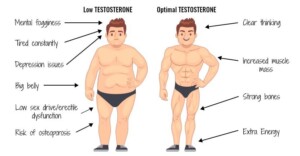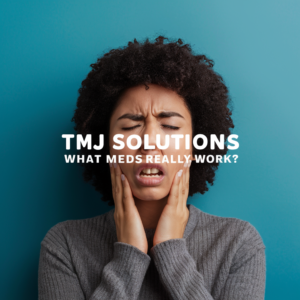Low testosterone, also known as hypogonadism, is a condition that affects many men. It can have various causes and consequences on physical and mental well-being. In this blog post, we will explore the causes of low testosterone, its impact on the body, potential solutions, and why it is an issue worth addressing.

Causes of Low Testosterone
- Age: As men age, testosterone production naturally declines. The decrease typically starts around the age of 30 and continues gradually throughout adulthood.
- Testicular Disorders: Conditions such as undescended testicles, testicular injury, or testicular cancer can disrupt normal testosterone production.
- Hormonal Disorders: Imbalances in the hypothalamus or pituitary gland, which regulate testosterone production, can lead to low testosterone levels.
- Chronic Illnesses: Conditions like obesity, diabetes, liver or kidney disease, HIV/AIDS, and hormonal disorders such as hypothyroidism can contribute to low testosterone.
- Medications and Treatments: Certain medications, including corticosteroids and opioids, can suppress testosterone production. Additionally, radiation or chemotherapy used in cancer treatment can affect testosterone levels.
- Lifestyle Factors: Unhealthy lifestyle choices like excessive alcohol consumption, smoking, sedentary behavior, poor diet, and chronic stress can contribute to low testosterone.
Impact of Low Testosterone
Low testosterone can have various effects on men’s health, including:
- Reduced Libido: Testosterone plays a crucial role in sexual desire and performance. Low testosterone levels can lead to a decrease in libido and sexual satisfaction.
- Erectile Dysfunction: Testosterone is involved in maintaining healthy erectile function. Low levels of testosterone can contribute to difficulties in achieving or maintaining erections.
- Fatigue and Decreased Energy: Testosterone is important for maintaining energy levels and overall vitality. Low testosterone can cause fatigue, decreased motivation, and a general sense of low energy.
- Loss of Muscle Mass and Strength: Testosterone is an anabolic hormone that helps build and maintain muscle mass. Low testosterone can lead to muscle loss, decreased strength, and difficulties in building muscle through exercise.
- Mood Changes: Testosterone influences mood regulation, and low levels can contribute to mood swings, irritability, and even depression.
Solutions for Low Testosterone
Treatment options for low testosterone may include:
- Testosterone Replacement Therapy (TRT): This involves providing external testosterone to raise hormone levels. It can be administered via gels, injections, patches, or pellets.
- Lifestyle Changes: Adopting a healthier lifestyle can positively impact testosterone levels. Regular exercise, weight management, a balanced diet, stress reduction, and limiting alcohol consumption can help improve testosterone production.
- Addressing Underlying Conditions: Treating underlying medical conditions, such as diabetes or hormonal disorders, can help restore testosterone levels.
- Medication Review: If low testosterone is a side effect of certain medications, consulting with a healthcare provider to explore alternative options or dosage adjustments may be beneficial.
The Importance of Addressing Low Testosterone
Low testosterone can significantly impact a man’s quality of life. It can affect sexual health, energy levels, mood, and overall well-being. Additionally, untreated low testosterone may contribute to long-term health risks, including osteoporosis, cardiovascular disease, and metabolic disorders.
Is Low Testosterone Serious?
While low testosterone itself may not be life-threatening, it can have substantial effects on physical and mental health. Seeking appropriate diagnosis and treatment is essential for maintaining overall well-being and a good quality of life.
Low testosterone in men can have various causes, including age, hormonal disorders, chronic illnesses, medications, and lifestyle factors. It can impact sexual health, energy levels, mood, and muscle mass. Addressing low testosterone through testosterone replacement therapy, lifestyle changes, and treating underlying conditions can lead to improved well-being and reduce the risk of long-term health complications. If you suspect low testosterone, consult with a healthcare professional for proper diagnosis and guidance.
As an Amazon Associate we earn from qualifying purchases through some links in our articles.




